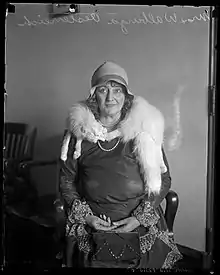Walburga Oesterreich
Walburga "Dolly" Oesterreich (née Korschel; 1880 German Empire – April 8, 1961 Los Angeles, California) was an American housewife, married to a wealthy textile manufacturer Fred William Oesterreich (December 8, 1877 – August 22, 1922). She gained notoriety for her bizarre 10-year affair with Otto Sanhuber (aka: Otto Weir, Walter Klein), which culminated in the shooting death of her husband.
Walburga "Dolly" Oesterreich | |
|---|---|
 Oesterreich c. 1930 | |
| Born | Walburga Korschel 1880 |
| Died | April 8, 1961 (aged 80–81) Los Angeles, California, U.S. |
The story inspired the feature film The Bliss of Mrs. Blossom as well as two made-for-TV movies: The Man in the Attic, with Neil Patrick Harris, and "Lover in the Attic", with Molly Burnett. Oesterreich was also the subject of Investigation Discovery's series A Crime to Remember in 2017 (Season 4, Episode 6, "Guess Who?").[1][2]
Dolly Oesterreich, 33 at the time, first became friendly with 17-year-old Otto Sanhuber around 1913 and described him as her "vagabond half-brother."[3][4]
The two quickly became lovers and met clandestinely at Sanhuber's boarding room or at a nearby hotel. They also arranged trysts at Dolly's home but, when neighbors began noting Otto's increasingly frequent comings and goings, and alerted her husband, Dolly suggested to Otto that he quit his job and secretly move into the Oesterreichs' upstairs attic to allay any further suspicions. He readily agreed to the arrangement. Not only would this put him in closer proximity to his lover but it would also give him time to pursue his dream of writing pulp fiction stories. Sanhuber would later describe himself as having been enslaved by Dolly.[5]
Dolly's husband Fred remained unaware of the new "boarder", though on several occasions he came close to discovering the deception.[4] When the Oesterreichs moved to Los Angeles in 1918, Dolly had already sent Sanhuber to await their arrival. Dolly deliberately chose a new house with an attic (somewhat of a rarity in Los Angeles), and once again Otto moved in to resume their affair.[4]
On August 22, 1922, after overhearing a loud argument between the Oesterreichs and believing Dolly to be in danger of physical harm, Sanhuber rushed from the attic, with .25 caliber pistols in hand. In the ensuing struggle, Sanhuber shot Fred Oesterreich three times, killing him. The two lovers then hastily staged the scene to look like a botched burglary. Sanhuber pocketed Fred's diamond watch while Dolly hid herself in a closet.[4]
Sanhuber had locked the closet door from the outside and tossed the key aside before returning to his attic refuge, and this fact played a key role in frustrating police efforts to press murder charges against Dolly despite their strong suspicions. With no knowledge of Otto Sanhuber's long-time presence in the house, they were hard-pressed to explain how Dolly could have killed her husband while locked in a closet.[5]
Sanhuber remained at large for eight years, eventually moving to Canada, changing his name to Walter Klein and marrying another woman before returning to Los Angeles. In 1930, after a falling out, Dolly's personal attorney (and current lover) Herman Shapiro revealed to police what he knew about Otto Sanhuber's involvement in the murder. Sanhuber was arrested and convicted of manslaughter but later released because the statute of limitations had expired.[4]
Dolly was arrested but her trial ended in a hung jury (most of the jurors leaning towards acquittal), and in 1936 the indictment against her was finally dropped. She remained in Los Angeles until her death in 1961.[1][3][5]
References
- Eddy, Cheryl (2015-07-06). "The Bizarre Case of the Unfaithful Wife and Her "Attic Man"". Gizmodo. Retrieved 2018-05-02.
- "Guess Who? | A Crime To Remember". www.investigationdiscovery.com. Retrieved 2018-05-02.
- Nugent, Addison (June 7, 2016). "The Married Woman Who Kept Her Lover in the Attic". Atlas Obscura. Retrieved January 23, 2017.
- "Vagabond". Time Magazine. 1930-04-28. Retrieved 2008-04-02.
- Rasmussen, Cecilia (1995-03-20). "'Bat Man' Case: a Lurid Tale of Love and Death". Los Angeles Times. ISSN 0458-3035. Retrieved 2018-05-02.
Further reading
- Hynd, Alan (1958). The Case of the Attic Lover and Other True Crime Stories. Pyramid Books.
- Nachaidh, Don (July 1930). "The Phantom in the House of Oesterreich". Startling Detective Adventures. 5 (26): 12–19, 95. Retrieved 2017-04-24.
- Winski, Norman (1965). Sex and the Criminal Mind. The Genell Corporation.
- Wolf, Marvin J.; Katherine Mader (1986). Fallen Angels. Facts on File Publications.